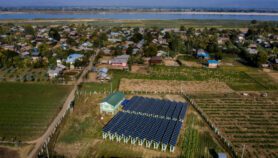Send to a friend
The details you provide on this page will not be used to send unsolicited email, and will not be sold to a 3rd party. See privacy policy.
With the right policies and investment in research, developing nations can turn their dependence on biomass fuels into a renewable and sustainable energy supply, says Duncan Macqueen.
Fuels derived from biomass — mainly wood, but also plant and animal matter — produce lower greenhouse gas emissions than fossil fuels, and can be converted into heat, electricity, liquid or gas. Yet they are considered dirty fuels, harmful to health and a threat to forests, with developing countries often making their production illegal.
But advanced new technologies can make burning these biofuels a ‘green’ process, argues Macqueen. Global dependence on biofuels will rise from 10 to 30 per cent by 2050, he says, and the developing world is already embracing this source of energy — supplying homes with wood-pellet boilers, for example, or building biomass power stations.
What is needed now is for developing countries to put biomass at the centre of energy policies; actively support research and development; legalise its production; and create incentives to increase supply. Small efforts are being made but these must be scaled up, says Macqueen.
Policies to promote the use of this fuel will help counter climate change and poverty, he argues. And any health hazards can be "easily solved" by better production processes and stove technologies.
Link to full article in IIED ![]() [161kB]
[161kB]













